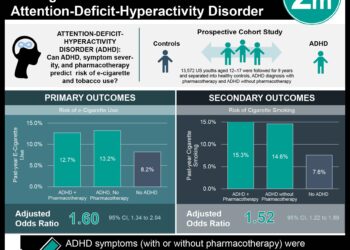Parents’ ADHD treatment preferences predict treatment initiation
Image: PD
1. Parents’ baseline preferences for ADHD medication and behavioral therapy (BT) are associated with subsequent initiation of each treatment.
2. The goal of improved academic achievement was associated with medication initiation, whereas the goals of improved behavioral compliance and interpersonal relationships were associated with BT initiation.
Evidence Rating Level: 2 (Good)
Study Rundown: Shared decision-making between families and clinicians is an important aspect of treating chronic disorders including attention-deficit/hyperactivity disorder (ADHD). The American Academy of Pediatrics (AAP) has emphasized incorporating family preference into the ADHD treatment plan, although no studies have examined parental preference on treatment initiation. The current study utilized the ADHD Preference and Goal Instrument (ADHD PGI) to evaluate the relationship between baseline preferences and goals and medication and/or BT initiation. Results indicate that preferences for medication and BT were associated with subsequent initiation of the preferred treatment. Furthermore, academic goals were associated with initiation of medication, while the goals of improved behavioral compliance and interpersonal relationships were associated with BT initiation. The study is limited by the focus on parental goals for treatment, without taking patient perspectives into account. These findings highlight the importance of eliciting parents’ preferences and goals, per AAP ADHD treatment guidelines, when discussing options and formulating treatment plans.
Click to read the study published today in Pediatrics
Relevant Reading: ADHD: clinical practice guideline for the diagnosis, evaluation, and treatment of attention-deficit/hyperactivity disorder in children and adolescents
Study Author, Dr. Alexander G. Fiks, MD, MSCE, talks to 2 Minute Medicine: Associate Director, Pediatric Research in Office Settings, The American Academy of Pediatrics
“The results of our study highlight the importance of parents’ priorities for their child–improved academic achievement, behavior, or interpersonal relationships–in determining what treatment they ultimately choose for their child’s ADHD. Assessing preferences and goals is a key component of shared decision making and has been recommended by the American Academy of Pediatrics’ ADHD guidelines, yet clinicians often do not fully explore these areas and may not present treatment options that align with families’ preferences and goals. Our results support the formal measurement of parents’ preferences and goals by clinicians as an important step in the ADHD treatment decision making process. The ADHD Preference and Goal Instrument is a tool clinicians can use to collect information on preferences and goals prior to visits to tailor conversations appropriately and address treatment barriers.”
In-Depth [prospective cohort study]: 148 parents with children 6-12 years of age diagnosed with ADHD were surveyed at two time points. The ADHD PGI, a survey using a Likert-type scale, was used to assess parents’ preferences and goals for ADHD treatment. Although 108 children were not receiving medication at baseline, 46% initiated medication within the six-month study period. Of the 124 children not receiving BT at baseline, 24% initiated BT within six months. Each 1-point increase in overall medication preference score was associated with a two-fold greater likelihood of initiating medication treatment (OR = 2.6). Similar trends were found for BT, with each 1-point increase in overall BT preference score associated with a two-fold greater likelihood of initiating BT (OR = 2.2). Higher support of the goal of improved academic achievement was associated with greater odds of medication initiation (OR = 2.2), while higher endorsement of the goals of behavioral compliance and interpersonal relationships was associated with BT initiation (OR = 1.6).
By Cordelia Y. Ross and Leah H. Carr
More from this author: Difficulty diagnosing autism spectrum disorders in Latino children; Children with abdominal pain at risk for anxiety, depression; Adolescent smoking heavily influenced by parents and siblings; Autistic boys spend more time playing video games; Parents’ TV viewing time is strongly associated with child viewing time
© 2013 2minutemedicine.com. All rights reserved. No works may be reproduced without expressed written consent from 2minutemedicine.com. Disclaimer: We present factual information directly from peer reviewed medical journals. No post should be construed as medical advice and is not intended as such by the authors, editors, staff or by 2minutemedicine.com. PLEASE SEE A HEALTHCARE PROVIDER IN YOUR AREA IF YOU SEEK MEDICAL ADVICE OF ANY SORT.







